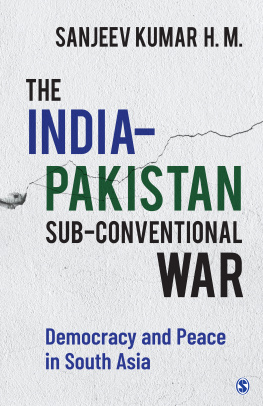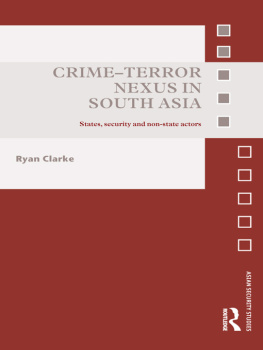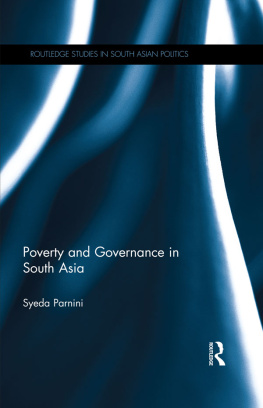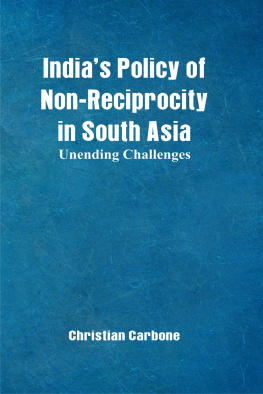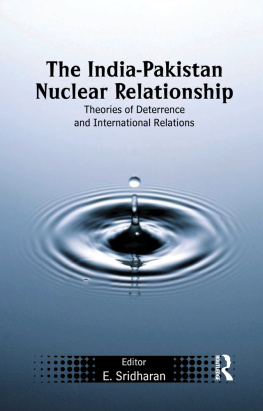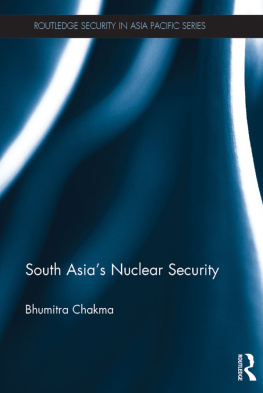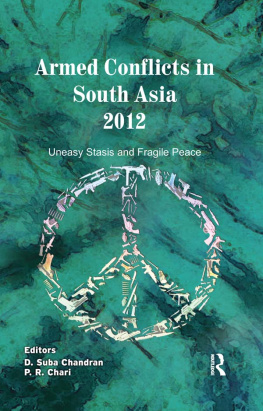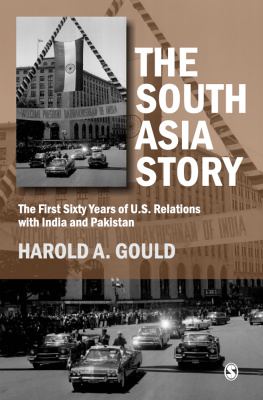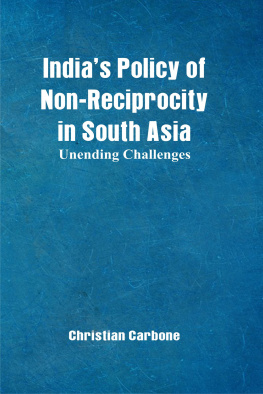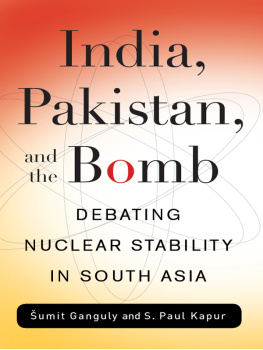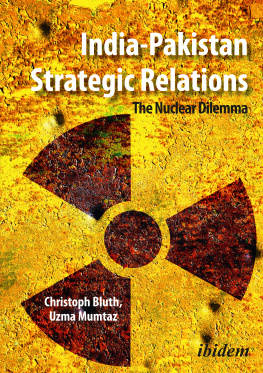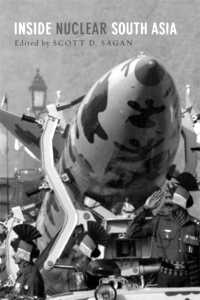SAGE was founded in 1965 by Sara Miller McCune to support the dissemination of usable knowledge by publishing innovative and high-quality research and teaching content. Today, we publish over 900 journals, including those of more than 400 learned societies, more than 800 new books per year, anda growing range of library products including archives, data, case studies, reports, and video. SAGE remains majority-owned by our founder, and after Sara's lifetime will become owned by a charitable trust that secures our continued independence.
Los Angeles | London | New Delhi | Singapore | Washington DC | Melbourne
THE INDIA-PAKISTAN SUB-CONVENTIONAL WAR
THE INDIA-PAKISTAN SUB-CONVENTIONAL WAR
Democracy and Peace in South Asia
CopyrightSanjeev Kumar H. M., 2022
All rights reserved. No part of this book may be reproduced or utilized in any form or by any means, electronic or mechanical, including photocopying, recording or by any information storage or retrieval system, without permission in writing from the publisher.
First published in 2022 by
SAGE Publications India Pvt Ltd
B1/I-1 Mohan Cooperative Industrial Area
Mathura Road, New Delhi 110 044, India
www.sagepub.in
SAGE Publications Inc
2455 Teller Road
Thousand Oaks, California 91320, USA
SAGE Publications Ltd
1 Oliver's Yard, 55 City Road
London EC1Y 1SP, United Kingdom
SAGE Publications Asia-Pacific Pte Ltd
18 Cross Street #10-10/11/12
China Square Central
Singapore 048423
Published by Vivek Mehra for SAGE Publications India Pvt Ltd. Typeset in 10.5/13 pt Berkeley by Zaza Eunice, Hosur, Tamil Nadu, India.
Library of Congress Cataloging-in-Publication Data
Names: H. M., Sanjeev Kumar, author.
Title: The India-Pakistan sub-conventional war: Democracy and peace in South Asia/Sanjeev Kumar H.M.
Other titles: Democracy and peace in South Asia
Description: Los Angeles: SAGE, [2022] | Includes index.
Identifiers: LCCN 2022011854 | ISBN 9789354794209 (hardback) | ISBN 9789354794216 (epub) | ISBN 9789354794223 (ebook)
Subjects: LCSH: PakistanForeign relationsIndia. | India--Foreign relationsPakistan. | Pakistan--Politics and government1988- | Jammu and Kashmir (India)Politics and government21st century. | National securitySouth Asia.
Classification: LCC DS388 .H57 2022 | DDC 355.02/17095491dc23/eng/20220316
LC record available at https://lccn.loc.gov/2022011854
ISBN: 978-93-5479-421-6 (ePub)
SAGE Team: Amrita Dutta, Shipra Pant and Rajinder Kaur
To Amma,
Late Smt. Renuka Devi,
the eternal source of my inspiration.
Thank you for choosing a SAGE product!
If you have any comment, observation or feedback, I would like to personally hear from you.
Please write to me atcontactceo@sagepub.in
Vivek Mehra, Managing Director and CEO, SAGE India.
Bulk Sales
SAGE India offers special discounts
for purchase of books in bulk.
We also make available special imprints
and excerpts from our books on demand.
For orders and enquiries, write to us at
Marketing Department
SAGE Publications India Pvt Ltd
B1/I-1, Mohan Cooperative Industrial Area
Mathura Road, Post Bag 7
New Delhi 110044, India
E-mail us atmarketing@sagepub.in
Subscribe to our mailing list
Write tomarketing@sagepub.in
This book is also available as an e-book.
ACKNOWLEDGEMENTS
This book has been the result of a long journey of academic pursuit, spanning nearly one and a half decades. During this lengthy peregrination, my research initiatives smoothly treaded their course, only because of the help, encouragement and constant support of friends, colleagues and well-wishers, without which my book would not have reached its ultimate destination. Hence, it is my bounden duty to extend heartfelt gratitude to all of them, who have been with me in this academic journey.
First, I would like to thank Ms Amrita Dutta, Associate Commissioning Editor for Academic Books at SAGE India, who has been like my mentor throughout the course of accomplishing this project. Without her constant support and encouragement, this book would not have seen the light of the day. While working with Ms Dutta, I learnt a lot, as she extended her guidance to me with a lot of affection like a loving and caring teacher. Similarly, I would have never succeeded in my academic pursuits, had it not been for the training and mentorship of my teacher, Professor Rajen Harshe. Very tough as a teacher but softest and gentlest as a human being, Professor Harshes personality has always been a role model which I always aspired to emulate. By monitoring the minutest aspect of my writing, Professor Harshe trained me in the art of doing research in the field of international relations and trained in what he calls the method of essay. I would also like to thank the anonymous reviewer, whose critical comments and suggestions greatly helped me in improving the arguments in the book.
The research for this book was greatly benefited by the generous funding that I received from the Institution of Eminence, University of Delhi, which was granted to me under its scheme of faculty research programme. I would like to thank the institution for the financial support which was extended to me for this project. Further, I will be failing in my duty if I dont thank the team of my dedicated and hardworking students, without whose help this book would not have reached its current form. They not only helped me to collect relevant sources for my research, discussed the project with me and extended their valuable comments, but also rendered great help in the course of the making of the manuscript by copyediting and preparing the document. They have been with me in my tough times and never made me feel alone. Hence, all that is good about this book is because of their efforts and any shortcomings in the book are mine. In this line, my deep sense of gratitude is due to Mr Anubhav Roy, Mr Jatin Kumar, Ms Swathi T., Ms Aakriti Vinayak, Ms Neha Mishra, Ms N. Eshika, Ms Ekta and Dr Vaishali Raghuvanshi.
This project was conceived during June 2009, when I visited the Indian Institute of Advanced Study at Shimla as a UGC IUC Associate. I thank the institute and its then director, Professor Peter Ronald deSouza, for inviting me and granting me a wonderful academic environment. The initial research for the book was carried out in the library of the institute during my three visits in June 2009, June 2010 and June 2013, and I thank the warmth and affection extended to me by the admin and library staff of the institute. Especially, the constant support of the assistant librarian Ms Pushpa during all my three visits was a great source of encouragement. In the institute, I got valuable suggestions and comments on the three lectures that I delivered as part of my work in progress on the book by Professor Peter deSouza, Professor Ghanshyam Shah, Professor Subrata K. Mitra, Dr Bhalchandra Nemade, Professor D. N. Dhanagare, Professor Madhavan K. Palat, Professor Rajkumar Hans, Professor Mangesh Kulkarni, Dr Varsha Bhagat-Ganguly, Dr Vasavi and Dr Sangeetha Menon. I was immensely benefitted by the help and support of my friends Professor Balaganapathi Devarakonda, Professor Sivadasan P. Mankada and Professor Siddharth Singh, during my stay at the Indian Institute of Advanced Study. I extend my sincere gratefulness to all of them. Further, I thank my friend and colleague at the University of Allahabad, Mr Sandeep Kumar Pankaj, who constantly supported me in all my research activities for this book. Similarly, I also thank my friend and colleague at the South Asian University, Dr Dhananjay Tripathi, for the support that I received from him during the course of writing this book. At the University of Delhi where I am teaching presently, I received valuable suggestions and comments for the book from my colleagues Professor Navnita Chadha Behera and late Professor Veena Kukreja. My colleague Professor Ujjwal Kumar Singh constantly took out time to call me or personally visit my office to ask about the progress of my work. I thank him for all his support and encouragement.

